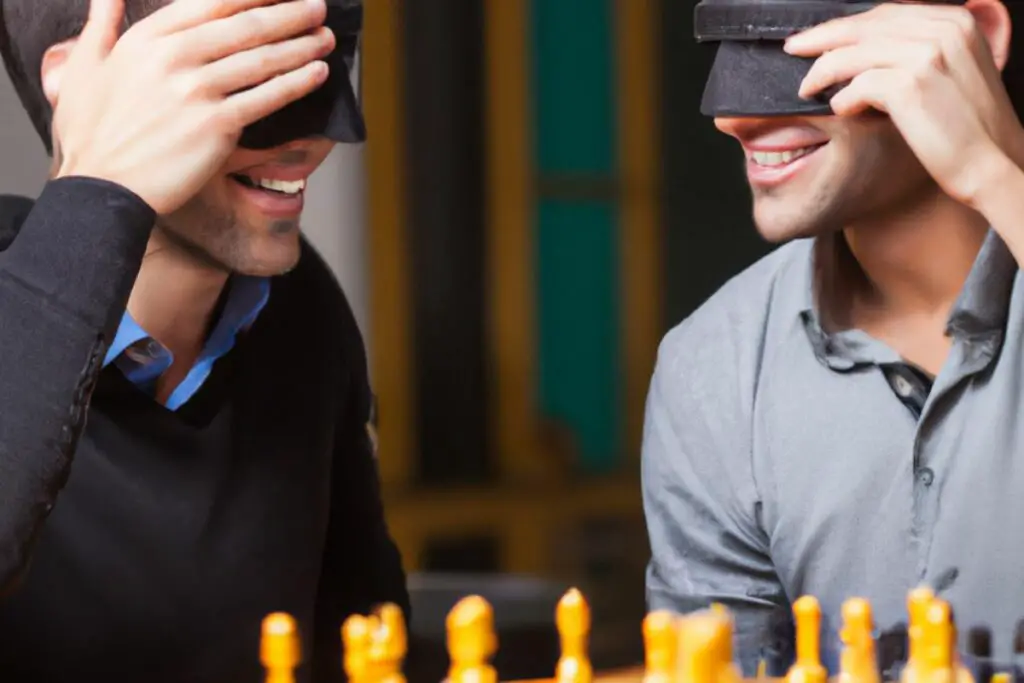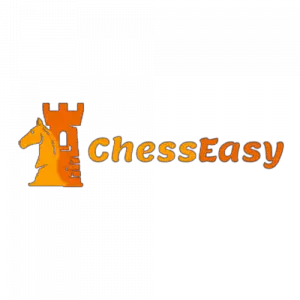You may have heard chess players discussing a chess game verbally, without setting up a chessboard. Entire game of chess can be played without the need of chessboard or pieces.
Blindfold chess is a form of chess where players play chess without seeing the chessboard or pieces. The game is played through verbal communication of chess notation. It forces the players to memorize the position which keeps changing through the entire game.

Blindfold chess requires a lot more concentration because the player has to find the best chess moves while retaining a clear mental image of the position. It is an exercise of memory and visualization both at the same time.
How to play blindfold chess?
For a beginner, to play entire game of chess blindfolded is very hard. You can visualize a first few opening moves easily, but then playing the game while memorizing the position correctly will become very difficult.
You can set up the chess set in front of you and play blindfold till you find it impossible to move further. Then you can play the moves on chessboard up to that position and start blindfold again from that position onwards. Thus, you can start by playing blindfold games in part.
However, even to play a part of a blindfold chess successfully, you first need to master some important concepts.
1. Understanding the Rules
To play blindfold chess, you need to understand the rules of chess. Blindfold chess uses the same rules as regular chess, but instead of physically moving the pieces, you communicate your moves to your opponent through a chess notation system.
2. Visualizing the Board
Visualizing the board is the key to playing blindfold chess. You need to be able to see the board in your mind and remember the position of each piece. To improve your visualization skills, you can practice solving chess puzzles and playing through chess games in your mind.
Look at the exercise below:


In diagram-1, imagine the knight moving to green marked squares, and identify their names. In diagram-2 identify the queen moves in the same way. Consider bottom right square as h1 for both positions.
3. Developing Memory Skills
Blindfold chess requires a strong memory. You need to remember the position of each piece and the moves made by both you and your opponent. To improve your memory skills, you can use memory techniques such as visualization, association, and repetition.
Tips to improve blindfold chess
After a regular practice of basics mentioned above, you will be able to visualize a good number of moves without the help of the chessboard. Here are some tips to improve blindfold chess further.
- Solve chess puzzles blindfolded. Start with mate in 1 and mate in 2 puzzles.
- Analyze your games blindfolded as much as you can.
- Make a habit of calculating without moving pieces.
- Practice memorizing random chess positions. See any position from any game and try to memorize it.
- Improve pattern recognition. More patterns you recognize, easier it will become to recall the position.
Pattern recognition is really the key to effortless blindfold chess. It is proven that if chess position is completely random with unrecognizable patterns, a chess grandmaster would find it equally difficult to visualize and remember as a master-level (2200) player.
A difference between strong chess player and a weak chess player majorly depends on how many patterns they know. Therefore learn as many patterns as you can.
Chess patterns can be learned in various forms. Openings, endgame theory, tactics, pawn structures, middle game concepts and so on.
Is it good to play blindfold chess?
Blindfold chess improves player’s calculation ability and stamina in the long run. Some believe that playing blindfold chess can damage mental health. However, it is only if one plays too much of it, then it can be harmful. Otherwise playing blindfold chess is definitely beneficial to chess players.
Blindfold chess also helps increase mental capacity in other areas of life, especially studies. Playing blindfold chess is similar to solving math puzzle without pen and paper. It clearly helps one exercise his brain.
Play with a partner who is equal to your level. Initially, you should keep the chess set in front of you so that you can clarify if you are making any mistakes in case the game becomes too difficult to play.
Benefits of blindfold chess
Here are some of the benefits in playing blindfold chess:
- Improves memory since it is a very good memory exercise.
- Improves visualization and analytical ability.
- Improves speed of thinking.
- Improves problem-solving skills.
- Improves confidence. Ability to play chess well without a chessboard gives a sense of accomplishment and a certain sense of competence.
Lastly, it improves spatial intelligence. Since one has to visualize the game, it becomes an exercise of creating shapes and forms in the brain.
Conclusion
If you are looking forward to play blindfold chess, it is suggested that you start small. Don’t try to play the entire game blindfolded on day-1. Take smaller steps which are necessary to build your pattern recognition abilities. Blindfold chess is an excellent exercise for brain and it helps in every other area of life as well.
